
cover art by H. R. Van Dongen
"Sam Hall" is a science fiction novelette by Poul Anderson, first published in Astounding Science Fiction in August 1953. [1]

"Sam Hall" is a science fiction novelette by Poul Anderson, first published in Astounding Science Fiction in August 1953. [1]
The story is set in a 21st-century in which the United States has descended into totalitarianism (while retaining the outward forms of republican government). In the aftermath of two additional world wars, the US regime now exercises a security hegemony over the entire remainder of the Earth, with only the Anglosphere nations enjoying some form of autonomy. The US also has exclusive control of all human settlements in the Solar System; the most important of these is a pre-Mariner habitable Venus, which hosts thorium mines operated by conscript labor under inhumane conditions, though there are also colonies on Mars, the Moon, and the Jovian satellites.
The story never elaborates what political developments led to this state of affairs. Its viewpoint character notes that it is conventional wisdom that the US loss in World War III had forced the nation to become a "garrison state" in order to prevail in World War IV, but it is not specified who the combatants in either of these conflicts had been; the USSR is never mentioned in the story (aside from the suggestive detail that Moscow, Idaho has been renamed to "Americatown.") Either of the world wars mentioned might correspond with a conflict ten years prior to the story, in which China had carried out "abortive" nuclear attacks on several American cities; at some point prior to that, the US had also fought (and won) a war against Brazil. The viewpoint character suspect the former may have been a false flag operation conducted by the US regime itself, and is certain that the latter conflict was a pretext to obtain basing rights and minerals.
Major Thornberg is a technical officer in command of an underground base built around "Matilda," a vast electromechanical computer that maintains a comprehensive national database of all US citizens' records and interactions. Thornberg is a veteran of the Brazilian war and considered politically reliable by the regime, but something in him snaps when his nephew is sent to a concentration camp and shortly thereafter murdered. In a minor act of rebellion, he uses his unrestricted access to Matilda to fabricate the existence of a small-time anti-government militant, whom he names "Sam Hall" after the angry folk song of the same name, and begins inserting false evidence of Hall's involvement into the records of real crimes. After a brewing anti-regime underground — whose attacks are becoming more brazen and frequent — starts to use the Sam Hall identity, the fictional rebel becomes a household name.
Unable to obtain any independently verifiable information on Hall, the government begins to suspect internal subversion and grows increasingly paranoid; meanwhile, the rebels emerge into the open and launch a full-scale civil war, billed as the "Third American Revolution." Thornberg takes advantage of the worsening chaos by inserting incriminating fabrications into the records of senior regime personnel, hoping to sow distrust among the ranks and bring down the government before it can recall its Venusian garrison troops — which include his son — to reinforce Earth. With the regime paralyzed and disintegrating, soldiers arrive at the Matilda base to arrest Thornberg, who is by this point himself unsure whether his treason has finally been discovered or whether he has merely been randomly implicated in one of his own fabricated witch-hunts. He forces the troops to surrender with a dead-man switch he has wired to an EMP that would wipe all the data stored in Matilda.
In an epilogue, Thornberg asks a rebel officer what will be done with Matilda; the man assures him it will be destroyed once the war ends, as the underground believes that a government with the ability to conduct this level of surveillance against its population is incompatible with democracy.
In 1964, Anderson produced a loose sequel in the short novel Three Worlds to Conquer, set on a US prison colony on Ganymede during the rebellion on Earth.
In 2004, the story was a finalist for the 1954 Retro-Hugo award for Best Novelette. [2] In 2014, the story was a finalist for the Prometheus Award Hall of Fame. [3] The story won the Prometheus Hall of Fame Award in 2020. [4]
James E. Gunn has said that the story shows how computers are vulnerable to unreliable data, [5] while Strange Horizons considers the story to be "as much (...) social commentary as science fiction". [6]
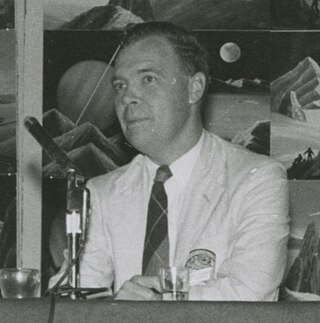
Harry Clement Stubbs, better known by the pen name Hal Clement, was an American science fiction writer and a leader of the hard science fiction subgenre. He also painted astronomically oriented artworks under the name George Richard.

Poul William Anderson was an American fantasy and science fiction author who was active from the 1940s until his death in 2001. Anderson also wrote historical novels. He won the Hugo Award seven times and the Nebula Award three times, and was nominated many more times for each award.
Gordon Rupert Dickson was a Canadian-American science fiction writer. He was inducted into the Science Fiction and Fantasy Hall of Fame in 2000.

James Edwin Gunn was an American science fiction writer, editor, scholar, and anthologist. His work as an editor of anthologies includes the six-volume Road to Science Fiction series. He won the Hugo Award for "Best Related Work" in 1983 and he won or was nominated for several other awards for his non-fiction works in the field of science fiction studies. The Science Fiction and Fantasy Writers of America made him its 24th Grand Master in 2007, and he was inducted by the Science Fiction and Fantasy Hall of Fame in 2015. His novel The Immortals was adapted into a 1970–71 TV series starring Christopher George.
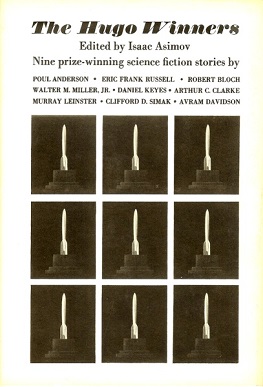
The Hugo Winners was a series of books which collected science fiction and fantasy stories that won a Hugo Award for Short Story, Novelette or Novella at the World Science Fiction Convention between 1955 and 1982. Each volume was edited by American writer Isaac Asimov, who wrote the introduction and a short essay about each author featured in the book. Through these essays, Asimov reveals personal anecdotes, which authors he's jealous of, and how other writers winning awards ahead of him made him angry. Additionally, he discusses his political beliefs, friendships, and his affinity for writers of "hard science fiction". The first two volumes were collected by Doubleday into a single book, which lacks a publishing date and ISBN.
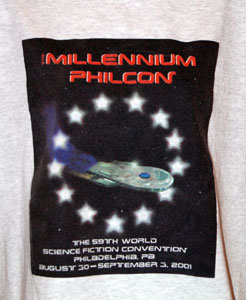
The 59th World Science Fiction Convention (Worldcon), also known as The Millennium Philcon, was held on 30 August–3 September 2001 at the Pennsylvania Convention Center and Philadelphia Marriott Hotel in Philadelphia, Pennsylvania, United States.
The 37th World Science Fiction Convention (Worldcon), also known as Seacon '79, was held on 23–26 August 1979 at the Metropole Hotel in Brighton, United Kingdom.
The 17th World Science Fiction Convention (Worldcon), also known as Detention, was held on 4–7 September 1959 at the Pick Fort Shelby Hotel in Detroit, Michigan, United States.
The 36th World Science Fiction Convention (Worldcon), also known as IguanaCon II, was held on 30 August–4 September 1978 at the Hyatt Regency Phoenix, Adams House, Phoenix Convention Center, and Phoenix Symphony Hall in Phoenix, Arizona, United States. Despite the name, this was the first "IguanaCon".
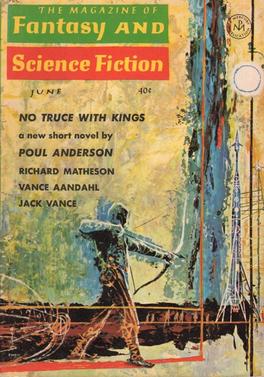
"No Truce With Kings" is a science fiction novella by American writer Poul Anderson. It won the Hugo Award for Best Short Fiction in 1964, and the Prometheus Award for Classic Fiction in 2010. The title is taken from Rudyard Kipling's poem "The Old Issue" (1899), in which kings represent tyranny or other forms of imposed rule, to be fought to preserve hard-won individual freedoms.
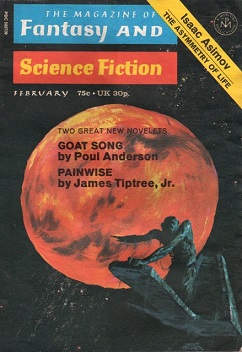
"Goat Song" is a science fiction novelette by American writer Poul Anderson. Originally published in The Magazine of Fantasy and Science Fiction issue of February 1972, it was later included in the anthologies Nebula Award Stories Eight and The Hugo Winners Volume 3, as well as in Anderson's collection Homeward and Beyond.
Pauline Whitby was a British science fiction author who wrote under the pseudonym Pauline Ashwell. She also wrote under the name Paul Ash. She took her pen names from Ashwell, Hertfordshire, near her birthplace of Hatfield, Hertfordshire.
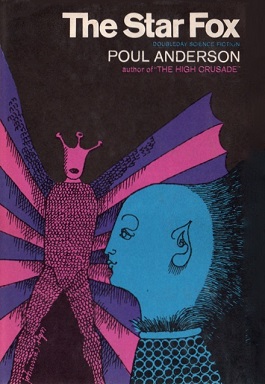
The Star Fox is a science fiction novel by Poul Anderson, first published in 1965. It was nominated for the Nebula Award for Best Novel in 1965.

The Dark Between the Stars is a 1981 collection of previously-published science fiction short stories by American writer Poul Anderson.

The following is a list of works by science fiction and fantasy author Poul Anderson.

Winners is a collection of science fiction award-winning short fiction by American writer Poul Anderson, first published in paperback by Tor Books in August 1981. The pieces were originally published between 1960 and 1972 in the magazines The Magazine of Fantasy and Science Fiction, Analog, and Galaxy Magazine.
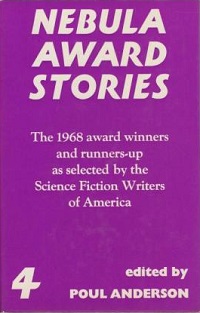
Nebula Award Stories 4 is an anthology of award-winning science fiction short works edited by Poul Anderson. It was first published in the United Kingdom in hardcover by Gollancz in November 1969. The first American edition was published by Doubleday in December of the same year. Paperback editions followed from Pocket Books in the U.S. in January 1971, and Panther in the U.K. in December 1971. The American editions bore the variant title Nebula Award Stories Four.

Brooke Bolander is an American author of speculative fiction.
The Only Harmless Great Thing is a 2018 alternate history story by Brooke Bolander, exploring the conjunction of Topsy the Elephant and the Radium Girls scandal. It was published by Tor.com.